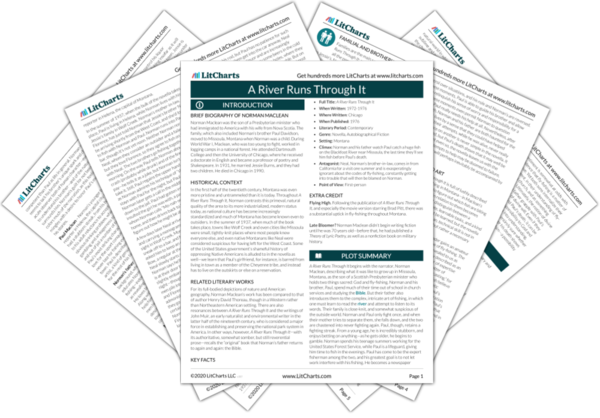Families are the main social structures in A River Runs Through It: apart from a few minor characters, all the people we meet belong to Norman’s family or to Jessie’s. Norman and Paul have even been taught to trust people less and less the further they get from their family home of Missoula, Montana. Steeped in the Biblical tradition, Norman’s family treats Paul as a kind of “prodigal son,” one who may stray far from correct morals, but who is always welcomed back joyfully into the family mode. Norman’s love for Paul, while part of this framework, is also mixed with a competitive spirit, as is normal for brothers near in age. His love also coexists with his struggle to understand his brother—as Norman’s father says, it is a tragic irony that those to whom we are closest, and love the most, are those that we understand the least. While Norman’s book seems to be an attempt to reach that kind of understanding, what the book itself portrays is the painfulness of not being able to understand those one loves.
In other cases, love proves a source of strength: after feeling beaten down by his inability to help Neal or Paul, Norman is rejuvenated by the love of Jessie and his female in-laws—a kind of love that is portrayed as purer but also less complex than the love between Norman and Paul. In general, the love of a family proves stronger than grief, envy, and even lack of understanding in the novel, though it doesn’t prevent—and perhaps even exacerbates—the pain that comes from loss.
Familial and Brotherly Love ThemeTracker

Familial and Brotherly Love Quotes in A River Runs Through It
Yet even in the loneliness of the canyon I knew there were others like me who had brothers they did not understand but wanted to help. We are probably those referred to as “our brothers’ keepers,” possessed of one of the oldest and possibly one of the most futile and certainly one of the most haunting of instincts. It will not let us go.

Unlock explanations and citation info for this and every other A River Runs Through It quote.
Plus so much more...
Get LitCharts A+I asked, “Do you think you should help him?”
“Yes,” he said, “I thought we were going to.”
“How?” I asked.
“By taking him fishing with us.”
“I’ve just told you,” I said, “he doesn’t like to fish.”
“Maybe so,” my brother replied. “But maybe what he likes is somebody trying to help him.”
“Help,” he said, “is giving part of yourself to somebody who comes to accept it willingly and needs it badly.”
“So it is,” he said, using an old homiletic transition, “that we can seldom help anybody. Either we don’t know what part to give or maybe we don’t like to give any part of ourselves. Then, more often than not, the part that is needed is not wanted. And even more often, we do not have the part that is needed.”
Then he told me, “In the part I was reading it says the Word was in the beginning, and that’s right. I used to think water was first, but if you listen carefully you will hear that the words are underneath the water.”
“That’s because you are a preacher first and then a fisherman,” I told him. “If you ask Paul, he will tell you that the words are formed out of water.”
“No,” my father said, “you are not listening carefully. The water runs over the words. Paul will tell you the same thing.”
“After you have finished your true stories sometime, why don’t you make up a story and the people that go with it? Only then will you understand what happened and why. It is those we live with and love and should know who elude us.”
Eventually, all things merge into one, and a river runs through it. The river was cut by the world’s great flood and runs over rocks from the basement of time. On some of the rocks are timeless raindrops. Under the rocks are the words, and some of the words are theirs.
I am haunted by waters.











